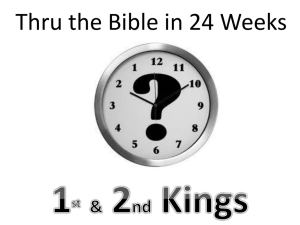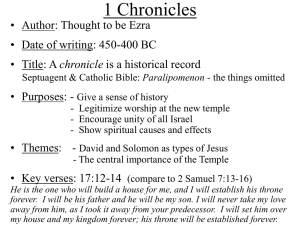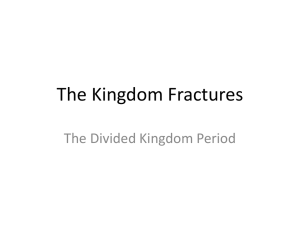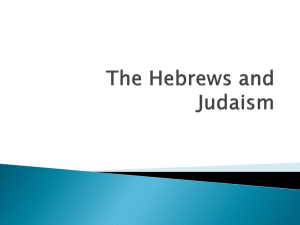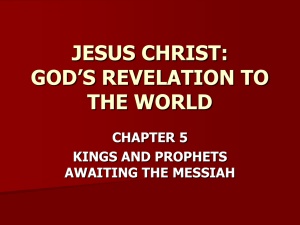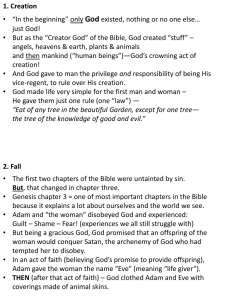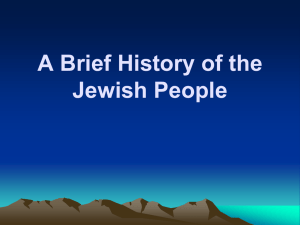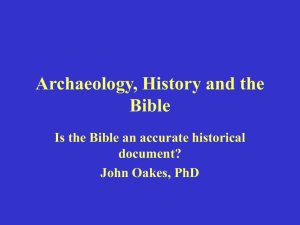1 and 2 Kings Lesson Slideshow
advertisement
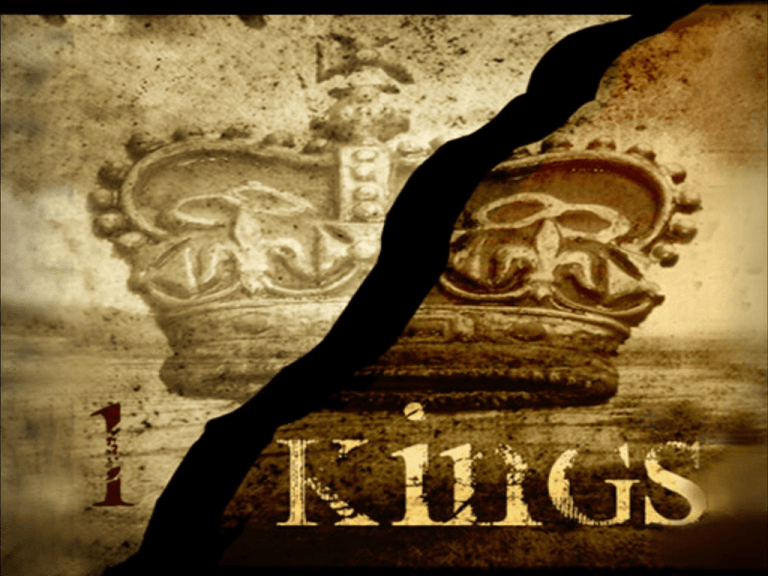
1 and 2 Kings The Books of 1 and 2 Kings were originally one book. This is the 2nd in the series of three double books. The Books are so named because their chief subject is the kings of Israel and Judah. These Books are a history of the kingdom from the time of Solomon to the time of the Babylonian exile and were written from a prophetic point of view. Most of the Books was written before the Babylonian captivity (586 B.C.). Two main facts support this: •Throughout the Books, the phrase “to this day” is used in describing the iniquity of the people before the captivity, •The last chapters of the Book of 2 Kings record the captivity itself . The last chapter goes 37 years into Jehoiakim’s captivity (605 B.C.) which would be 568 B.C. Authorship Some believe the author was a Jewish captive living in Babylon, and others believe the prophet Jeremiah is the author. Evidence that points Jeremiah as the author of 1 and 2 Kings includes: • Jeremiah lived during the Babylonian exile or captivity, • The Books are clearly written from the prophetic point of view, • The style of writing is similar to Jeremiah, and 2 Kings 24:18 - 25:30 is the same as Jeremiah 52, • Jewish Talmudic tradition attributes the Books to Jeremiah, • The last chapter may have been written by someone else, since it appears to come from Babylon and Jeremiah was exiled into Egypt (Jeremiah 43:1-8), and • The author of Kings used several sources and incorporated his own personal observations in the Books. The Historical Purposes Of Both Books To provide a historical record of the main acts of the kings of Israel and Judah from the glory of Solomon’s united kingdom to the shame and judgment of the divided and then captive kingdoms. Of 1 Kings 1. To continue the story of the united monarchy under David’s son Solomon. 2. To record the division of the kingdom into North and South and the spiritual issues that brought about those events.. Of 2 Kings 1. To continue the story of the divided kingdom period. 2. To record the taking of both the Northern and Southern Kingdoms into captivity The Doctrinal Purpose The central doctrinal teaching is that conformity to the law of God brings prosperity while apostasy leads to captivity. The main messages are: DIVISION BECAUSE OF DISOBEDIENCE and THE FAITHFULNESS OF GOD TO THE DAVIDIC COVENANT The Christological Purpose The messianic implication is clear: Despite human sin and failure, God is faithful to the Davidic covenant (2 Sam. 7). The Messiah will come through the tribe of Judah and will be a son of David; the throne of Israel will be preserved. The splendor of the coming of the kingdom of Christ is illustrated in the person of Solomon. (Matthew 12:42: “greater than Solomon is here.”) • 1 Kings records the division of the united kingdom of Saul, David, and Solomon in two kingdoms – known as ISRAEL and JUDAH. • 2 Kings records the collapse, or the captivity, of both Judah and Israel. • The name ISRAEL, comprised of 10 tribes, became the northern kingdom with Samaria as capital. • The kingdom of JUDAH, comprised of 2 tribes (Judah and Benjamin), becomes the southern kingdom with Jerusalem as the capital. What is 1 Kings About? 1 Kings is divided into two parts: A. The united monarchy under Solomon in chapters 1-11, (11:11 is the tragic turning point and the key to the whole story) GREAT GLORY! The great 40-year reign of King Solomon B. The divided monarchies which began under Jeroboam and Rehoboam in chapters 12-22. The first 80 years of GREAT the two kingdoms SHAME! Basic Outline of 1 Kings I. The United Monarchy Under Solomon: Chapters 1-11 A. Ascension to the Throne; Solomon’s Wisdom (1-3) B. Establishment of the Kingdom; Solomon’s Wealth (4-10) 1. 2. 3. Domestic prosperity (4) Religious achievements (4-10) Political Stability (9-10) C. Solomon’s Spiritual Failure and Wickedness; End of Reign (11) II. The Divided Monarchies of Israel and Judah: Chapters 12-22 A. The Revolt of the Ten Tribes of Israel (12) B. The Reign of the Early Kings of Israel and Judah (13-16) C. The Reforms of Elijah (17-19) 1. 2. 3. Elijah and the famine (17) Elijah and the fight on Mount Carmel (18) Elijah and the flight from Jezebel (19) D. The Reign of Ahab (20-22) 1. 2. 3. Ben-hada, his enemy (20) Naboth, his envy (21) Jehoshaphat, his end (22) Basic Outline of 1 Kings I. The United Monarchy Under Solomon: Chapters 1-11 (The Message) A. Solomon’s Ascension to the Throne; Solomon’s Wisdom (1-3) 1 King David grew old. The years had caught up with him. 5-6 At this time Adonijah, whose mother was Haggith, puffed himself up saying, “I’m the next king!” He made quite a splash, with chariots and riders and fifty men to run ahead of him. His father had spoiled him rotten as a child, never once reprimanding him. Besides that, he was very good-looking and the next in line after Absalom. 11-14 Nathan went to Bathsheba, Solomon’s mother, “Did you know that Adonijah, Haggith’s son, has taken over as king, and our master David doesn’t know a thing about it? Quickly now, let me tell you how you can save both your own life and Solomon’s. Go immediately to King David. Speak up: ‘Didn’t you, my master the king, promise me, “Your son Solomon will be king after me and sit on my throne”? 29-30 The king solemnly promised, “As GOD lives, the God who delivered me from every kind of trouble, I’ll do exactly what I promised in GOD’s name, the God of Israel: Your son Solomon will be king after me and take my place on the throne. And I’ll make sure it happens this very day.” 2 1-4 When David’s time to die approached, he charged his son Solomon, saying, “I’m about to go the way of all the earth, but you—be strong; show what you’re made of! Do what GOD tells you. Walk in the paths he shows you: Follow the life-map absolutely, keep an eye out for the signposts, his course for life set out in the revelation to Moses; then you’ll get on well in whatever you do and wherever you go. Then GOD will confirm what he promised me when he said, ‘If your sons watch their step, staying true to me heart and soul, you’ll always have a successor on Israel’s throne.’ 10-12 Then David joined his ancestors. He was buried in the City of David. David ruled Israel for forty years—seven years in Hebron and another thirty-three in Jerusalem. Solomon took over on the throne of his father David; he had a firm grip on the kingdom. Basic Outline of 1 Kings I. The United Monarchy Under Solomon: Chapters 1-11 (The Message) A. Solomon’s Ascension to the Throne; Solomon’s Wisdom (1-3) 3 1-3 Solomon arranged a marriage contract with Pharaoh, king of Egypt. He married Pharaoh’s daughter and brought her to the City of David until he had completed building his royal palace and GOD’s Temple and the wall around Jerusalem. Meanwhile, the people were worshiping at local shrines because at that time no temple had yet been built to the Name of GOD. Solomon loved GOD and continued to live in the God-honoring ways of David his father, except that he also worshiped at the local shrines, offering sacrifices and burning incense. 4-5 The king went to Gibeon, the most prestigious of the local shrines, to worship. He sacrificed a thousand Whole-Burnt-Offerings on that altar. That night, there in Gibeon, GOD appeared to Solomon in a dream: God said, “What can I give you? Ask.” 9 “Here’s what I want: Give me a God-listening heart so I can lead your people well, discerning the difference between good and evil. For who on their own is capable of leading your glorious people?” 10-14 God, the Master, was delighted with Solomon’s response. And God said to him, “Because you have asked for this and haven’t grasped after a long life, or riches, or the doom of your enemies, but you have asked for the ability to lead and govern well, I’ll give you what you’ve asked for—I’m giving you a wise and mature heart. There’s never been one like you before; and there’ll be no one after. As a bonus, I’m giving you both the wealth and glory you didn’t ask for—there’s not a king anywhere who will come up to your mark. And if you stay on course, keeping your eye on the lifemap and the God-signs as your father David did, I’ll also give you a long life.” Basic Outline of 1 Kings I. The United Monarchy Under Solomon: Chapters 1-11 A. Solomon’s Ascension to the Throne; Solomon’s Wisdom (1-3) 3 16-21 The very next thing, two prostitutes showed up before the king. The one woman said, “My master, this woman and I live in the same house. While we were living together, I had a baby. Three days after I gave birth, this woman also had a baby. We were alone—there wasn’t anyone else in the house except for the two of us. The infant son of this woman died one night when she rolled over on him in her sleep. She got up in the middle of the night and took my son—I was sound asleep, mind you!—and put him at her breast and put her dead son at my breast. When I got up in the morning to nurse my son, here was this dead baby! But when I looked at him in the morning light, I saw immediately that he wasn’t my baby.” 22 “Not so!” said the other woman. “The living one’s mine; the dead one’s yours.” The first woman countered, “No! Your son’s the dead one; mine’s the living one.” They went back and forth this way in front of the king. 24 After a moment the king said, “Bring me a sword.” They brought the sword to the king. 25 Then he said, “Cut the living baby in two—give half to one and half to the other.” 26 The real mother of the living baby was overcome with emotion for her son and said, “Oh no, master! Give her the whole baby alive; don’t kill him!” But the other one said, “If I can’t have him, you can’t have him—cut away!” 27 The king gave his decision: “Give the living baby to the first woman. Nobody is going to kill this baby. She is the real mother.” 28 The word got around—everyone in Israel heard of the king’s judgment. They were all in awe of the king, realizing that it was God’s wisdom that enabled him to judge truly. Basic Outline of 1 Kings I. The United Monarchy Under Solomon: Chapters 1-11 (The Message) B. Establishment of the Kingdom; Solomon’s Wealth (4-10) 1. Domestic prosperity (4) 20-21 Judah and Israel were densely populated—like sand on an ocean beach! All their needs were met; they ate and drank and were happy. Solomon was sovereign over all the kingdoms from the River Euphrates in the east to the country of the Philistines in the west, all the way to the border of Egypt. They brought tribute and were vassals of Solomon all his life. 24-25 Solomon was sovereign over everything, countries and kings, west of the River Euphrates from Tiphsah to Gaza. Peace reigned everywhere. Throughout Solomon’s life, everyone in Israel and Judah lived safe and sound, all of them from Dan in the north to Beersheba in the south—content with what they had. 32 He became famous among all the surrounding nations. He created 3,000 proverbs; his songs added up to 1,005. 34 Sent by kings from all over the earth who had heard of his reputation, people came from far and near to listen to the wisdom of Solomon. 4 Basic Outline of 1 Kings I. The United Monarchy Under Solomon: Chapters 1-11 (The Message) B. Establishment of the Kingdom; Solomon’s Wealth (4-10) 2. Religious achievements (5-8) 5 13-18 King Solomon raised a workforce of thirty thousand men from all over Israel. He sent them in shifts of ten thousand each month to the Lebanon forest; they would work a month in Lebanon and then be at home two months. Solomon also had seventy thousand unskilled workers and another eighty thousand stonecutters up in the hills—plus thirty-three hundred foremen managing the project and supervising the work crews. Following the king’s orders, they quarried huge blocks of the best stone—dressed stone for the foundation of The Temple. 6 1-6 Four hundred and eighty years after the Israelites came out of Egypt, in the fourth year of Solomon’s rule over Israel, in the month of Ziv, the second month, Solomon started building The Temple of GOD. 7 27-33 Hiram also made ten washstands of bronze... 38-40 He also made ten bronze washbasins,… 8 62-63 The king and all Israel with him then worshiped, offering sacrifices to GOD. Solomon offered Peace-Offerings, sacrificing to GOD 22,000 cattle and 120,000 sheep. This is how the king and all Israel dedicated The Temple of GOD. Basic Outline of 1 Kings I. The United Monarchy Under Solomon: Chapters 1-11 (The Message) C. Solomon’s Spiritual Failure and Wickedness; End of Reign (11) 11 1-5 King Solomon was obsessed with women. Pharaoh’s daughter was only the first of the many foreign women he loved—Moabite, Ammonite, Edomite, Sidonian, and Hittite. He took them from the surrounding pagan nations of which GOD had clearly warned Israel, “You must not marry them; they’ll seduce you into infatuations with their gods.” Solomon fell in love with them anyway, refusing to give them up. He had seven hundred royal wives and three hundred concubines—a thousand women in all! And they did seduce him away from God. As Solomon grew older, his wives beguiled him with their alien gods and he became unfaithful—he didn’t stay true to his GOD as his father David had done. Solomon took up with Ashtoreth, the whore goddess of the Sidonians, and Molech, the horrible god of the Ammonites. 6-8 Solomon openly defied GOD; he did not follow in his father David’s footsteps. He went on to build a sacred shrine to Chemosh, the horrible god of Moab, and to Molech, the horrible god of the Ammonites, on a hill just east of Jerusalem. He built similar shrines for all his foreign wives, who then polluted the countryside with the smoke and stench of their sacrifices. 9-10 GOD was furious with Solomon for abandoning the GOD of Israel, the God who had twice appeared to him and had so clearly commanded him not to fool around with other gods. Solomon faithlessly disobeyed GOD’s orders. 11-13 GOD said to Solomon, “Since this is the way it is with you, that you have no intention of keeping faith with me and doing what I have commanded, I’m going to rip the kingdom from you and hand it over to someone else. But out of respect for your father David I won’t do it in your lifetime. It’s your son who will pay—I’ll rip it right out of his grasp. Even then I won’t take it all; I’ll leave him one tribe in honor of my servant David and out of respect for my chosen city Jerusalem.” Basic Outline of 1 Kings II. The Divided Monarchies of Israel and Judah: Chapters 12-22 A. The Revolt of the Ten Tribes of Israel (12) 12 1-2 Rehoboam traveled to Shechem where all Israel had gathered to inaugurate him as king. Jeroboam had been in Egypt, where he had taken asylum from King Solomon; when he got the report of Solomon’s death he had come back. 20 When the word was out that Jeroboam was back and available, the assembled people invited him and inaugurated him king over all Israel. The only tribe left to the Davidic dynasty was Judah. 3-4 Rehoboam assembled Jeroboam and all the people. They said to Rehoboam, “Your father made life hard for us—worked our fingers to the bone. Give us a break; lighten up on us and we’ll willingly serve you.” 10-11 The young turks he’d grown up with said, “These people who complain, ‘Your father was too hard on us; lighten up’—well, tell them this: ‘My little finger is thicker than my father’s waist. If you think life under my father was hard, you haven’t seen the half of it. My father thrashed you with whips; I’ll beat you bloody with chains!’” 28-30 So the king came up with a plan: He made two golden calves. Then he announced, “It’s too much trouble for you to go to Jerusalem to worship. Look at these—the gods who brought you out of Egypt!” He put one calf in Bethel; the other he placed in Dan. This was blatant sin. Think of it— people traveling all the way to Dan to worship a calf! Basic Outline of 1 Kings II. The Divided Monarchies of Israel and Judah: Chapters 12-22 B. The Reign of the Early Kings of Israel and Judah (13-16) 15 11-15 Asa conducted himself well before GOD, reviving the ways of his ancestor David. He cleaned house: He got rid of the sacred prostitutes and threw out all the idols his predecessors had made. Asa spared nothing and no one; he went so far as to remove Queen Maacah from her position because she had built a shockingly obscene memorial to the whore goddess Asherah. Asa tore it down and burned it up in the Kidron Valley. Unfortunately, he didn’t get rid of the local sex-and-religion shrines. But he was well-intentioned—his heart was in the right place, in tune with GOD. Basic Outline of 1 Kings II. The Divided Monarchies of Israel and Judah: Chapters 12-22 C. The Reforms of Elijah (17-19) 2. 2-4 GOD Elijah and the famine (17) 17: then told Elijah, …Head east and hide out at the Kerith Ravine on the other side of the Jordan River. You can drink fresh water from the brook; I’ve ordered the ravens to feed you.” 17: 21-23 Three times he stretched himself out full-length on the boy, praying with all his might, “GOD, my God, put breath back into this boy’s body!” GOD listened to Elijah’s prayer and put breath back into his body—he was alive! Elijah picked the boy up, carried him downstairs from the loft, and gave him to his mother. “Here’s your son,” said Elijah, “alive!” Basic Outline of 1 Kings II. The Divided Monarchies of Israel and Judah: Chapters 12-22 C. The Reforms of Elijah (17-19) 2. Elijah and the fight on Mount Carmel (18) 18: 38 Immediately the fire of GOD fell and burned up the offering, the wood, the stones, the dirt, and even the water in the trench. 39 All the people saw it happen and fell on their faces in awed worship, exclaiming, “GOD is the true God! GOD is the true God!” 40 Elijah told them, “Grab the Baal prophets! Don’t let one get away!” They grabbed them. Elijah had them taken down to the Brook Kishon and they massacred the lot. 41 Elijah said to Ahab, “Up on your feet! Eat and drink—celebrate! Rain is on the way; I hear it coming.” Basic Outline of 1 Kings II. The Divided Monarchies of Israel and Judah: Chapters 12-22 C. The Reforms of Elijah (17-19) 3. Elijah and the flight from Jezebel (19) 19 1-2 Ahab reported to Jezebel everything that Elijah had done, including the massacre of the prophets. Jezebel immediately sent a messenger to Elijah with her threat: “The gods will get you for this and I’ll get even with you! By this time tomorrow you’ll be as dead as any one of those prophets.” 3-5 When Elijah saw how things were, he ran for dear life to Beersheba, far in the south of Judah. He came to a lone broom bush and collapsed in its shade, wanting in the worst way to be done with it all—to just die: “Enough of this, GOD! Take my life—I’m ready to join my ancestors in the grave!” Exhausted, he fell asleep under the lone broom bush. Suddenly an angel shook him awake and said, “Get up and eat!” 1314 When Elijah heard the quiet voice, he muffled his face with his great cloak, went to the mouth of the cave, and stood there. A quiet voice asked, “So Elijah, now tell me, what are you doing here?” Elijah said it again, “I’ve been working my heart out for GOD, the GOD-of-the-AngelArmies, because the people of Israel have abandoned your covenant, destroyed your places of worship, and murdered your prophets. I’m the only one left, and now they’re trying to kill me.” 15-18 GOD said, “…Meanwhile, I’m preserving for myself seven thousand souls: the knees that haven’t bowed to the god Baal…” Basic Outline of 1 Kings II. The Divided Monarchies of Israel and Judah: Chapters 12-22 D. The Reign of Ahab (20-22) 1. 2. Ben-hada, his enemy (20) Naboth, his envy (21) 21 1-2 And then, to top it off, came this: Naboth the Jezreelite owned a vineyard in Jezreel that bordered the palace of Ahab king of Samaria. One day Ahab spoke to Naboth, saying, “Give me your vineyard so I can use it as a kitchen garden; it’s right next to my house—so convenient. In exchange I’ll give you a far better vineyard, or if you’d prefer I’ll pay you money for it.” 3-4 But Naboth told Ahab, “Not on your life! So help me GOD, I’d never sell the family farm to you!” 17-19 Then GOD stepped in and spoke to Elijah the Tishbite, “On your feet; go down and confront Ahab …Then tell him, ‘GOD’s verdict: The very spot where the dogs lapped up Naboth’s blood, they’ll lap up your blood—that’s right, your blood.’” 23-24 As for Jezebel, GOD said, “Dogs will fight over the flesh of Jezebel all over Jezreel. Anyone tainted by Ahab who dies in the city will be eaten by stray dogs; corpses in the country will be eaten by carrion crows.” Basic Outline of 1 Kings II. The Divided Monarchies of Israel and Judah: Chapters 12-22 D. The Reign of Ahab (20-22) 1. Jehoshaphat, his end (22) 22 34 Just then someone, without aiming, shot an arrow randomly into the crowd and hit the king of Israel in the chink of his armor. The king told his charioteer, “Turn back! Get me out of here— I’m wounded.” 35-37 All day the fighting continued, hot and heavy. Propped up in his chariot, the king watched from the sidelines. He died that evening. Blood from his wound pooled in the chariot. As the sun went down, shouts reverberated through the ranks, “Abandon camp! Head for home! The king is dead!” 37-38 The king was brought to Samaria and there they buried him. They washed down the chariot at the pool of Samaria where the town whores bathed, and the dogs lapped up the blood, just as GOD’s word had said. Basic Outline of 2 Kings I. The Deterioration of Israel and Judah: Chapters 1-17 A. The Decline of Israel and Judah (1-16) B. The Deportation of Israel to Assyria (17) II. The Deportation of Judah: Chapters 18-25 A. The Decline of the Davidic Dynasty (18-23b) B. The Deportation of the Davidic Dynasty to Babylon (23c-25) 2 KINGS IS THE BOOK OF CAPTIVITIES Basic Outline of 2 Kings I. The Deterioration of Israel and Judah: Chapters 1-17 A. The Decline of Israel and Judah (1-16) 1 2 One day Ahaziah fell through the balcony railing on the rooftop of his house in Samaria and was injured. He sent messengers off to consult Baal-Zebub, the god of Ekron, “Am I going to recover from this accident?” 9 The king sent a captain with fifty men to Elijah. Meanwhile Elijah was sitting, big as life, on top of a hill. The captain said, “O Holy Man! King’s orders: Come down!” 10 Elijah answered the captain of the fifty, “If it’s true that I’m a ‘holy man,’ lightning strike you and your fifty men!” Out of the blue lightning struck and incinerated the captain and his fifty. 16 Elijah told him, “GOD’s word: Because you sent messengers to consult Baal-Zebub the god of Ekron, as if there were no God in Israel to whom you could pray, you’ll never get out of that bed alive—already you’re as good as dead.” 17 And he died, exactly as GOD’s word spoken by Elijah had said. Basic Outline of 2 Kings I. The Deterioration of Israel and Judah: Chapters 1-17 A. The Decline of Israel and Judah (1-16) 2 7 Meanwhile, fifty men from the guild of prophets gathered some distance away while the two of them stood at the Jordan. 8 Elijah took his cloak, rolled it up, and hit the water with it. The river divided and the two men walked through on dry land. 9 When they reached the other side, Elijah said to Elisha, “What can I do for you before I’m taken from you? Ask anything.” Elisha said, “Your life repeated in my life. I want to be a holy man just like you.” 10 “That’s a hard one!” said Elijah. “But if you’re watching when I’m taken from you, you’ll get what you’ve asked for. But only if you’re watching.” 11-14 And so it happened. They were walking along and talking. Suddenly a chariot and horses of fire came between them and Elijah went up in a whirlwind to heaven. Elisha saw it all and shouted, “My father, my father! You—the chariot and cavalry of Israel!” When he could no longer see anything, he grabbed his robe and ripped it to pieces. Then he picked up Elijah’s cloak that had fallen from him, returned to the shore of the Jordan, and stood there. He took Elijah’s cloak—all that was left of Elijah!—and hit the river with it, saying, “Now where is the GOD of Elijah? Where is he?” When he struck the water, the river divided and Elisha walked through. 15 The guild of prophets from Jericho saw the whole thing from where they were standing. They said, “The spirit of Elijah lives in Elisha!” They welcomed and honored him. JEHORAM, or Joram, died without an heir to the throne. He was an evil king. The daughter of Ahab was his wife. During his reign, the prophet Elisha : • predicted the defeat of Moab at Israel’s hand (chapter 3), • miraculously filled the vessels of a poor prophet’s wife (chapter 4a), • raised up the Shunammite woman’s dead son (chapter 4b), • rendered the poison pottage harmless (chapter 4c), • commanded the leper Naaman to dip seven times in the Jordan for a miraculous healing (chapter 5), • made the axe-head swim in the water (chapter 6), • predicted the fate of Samaria that made possible the deliverance of the four lepers (chapter 7), and • pronounced the recovery of Ben-hadad, king of Syria (chapter 8). JEHU, reigned 28 years (chapters 9-10). He gained fame both as the slayer of the evil Jezebel and as the king of Israel mentioned in the famous Black Obelisk as a vassal of the Syrian King Hazael, the son of Benhadad. “But Jehu was not careful to walk in the law of the Lord…;” he did not turn from the sins of Jeroboam, which made Israel to sin” (10:31). Jezebel falling to her death. 2 Kings 9:30-37 The Black Obelisk of Shalmaneser III, who ruled ancient Assyria around 850 BC. One of the carved images revealed Jehu, the king of Israel bowing before the powerful monarch with his face to the ground. ATHALIAH, the only woman in the regal list, was the “Bloody Mary” of the Old Testament. Her reign of terror was relatively short (6 years), but she almost succeeded in eliminating the bloodline of the Messiah. She killed all the heirs to the Davidic throne except baby Joash, whom Jehosheba, sister of Ahaziah, nursed and hid from the wicked queen (chapter 11). Athaliah disrupted the coronation ceremony of Joash. She was seized and put to death. 2 Kings 11:30-37 JOASH, was crowned king at the tender age of seven after Athaliah was “slain with the sword at the king’s house.” Joash reigned forty long and righteous years during the ministry of Joel the prophet. Joash is responsible for reparing the Temple of God and restoring the worship of the Lord in Jerusalem (chapter 12). AHAZ, is famous for erecting the sundial which God later used to indicate to Hezekiah that He was granting him fifteen more years of life. Ahaz was an idol worshiper, burning his own son as a sacrifice. His pro-Assyrian policy resulted in the removal to Assyria some of the treasured adornments of the Temple of God (chapter 16). Basic Outline of 2 Kings I. The Deterioration of Israel and Judah: Chapters 1-17 B. The Deportation of Israel to Assyria (17) HOSHEA, the last king of the northern tribes, was taken into captivity by the Assyrians in 722 B.C. during the reign of Ahaz in the south. In the 9th year of Hosea, Shalmaneser took Samaria and carried the remaining tribes into Assyrian captivity. By leaving some Israelites behind and transplanting some other captives from foreign lands, the Assyrians set the stage for the development, through intermarriage, of a people known as Samaritans, who are later despised by the Jews. Under 20 kings and 9 dynasties the northern kingdom was characterized by idolatry and immorality. Moses warned of this over 400 years before (Deut. 28). All the prophets after Moses had exhorted the kings to turn from their sins, and finally the judgment of God fell. (17:12-18). Basic Outline of 2 Kings II. The Deportation of Judah: Chapters 18-25 A. The Decline of the Davidic Dynasty (18-23b) The last half of 2 Kings treats only the southern kingdom, Judah, which remained behind after captivity of the northern tribes. Beginning with Hezekiah, this is the list of the final kings who reigned before the Babylonian exile. Basic Outline of 2 Kings II. The Deportation of Judah: Chapters 18-25 A. The Decline of the Davidic Dynasty (18-23b) HEZEKIAH, began his 29 year reign by destroying the brazen serpent Moses had made in the wilderness because Judah had misused it as an object of worship (18:4). He broke down idols and destroyed the high places. His reformation was followed by the celebration of the Passover. He engaged in a successful war against the Philistines. He fortified the military defense and expanded trade. Hezekiah was not without flaw. He was prideful when he showed off all his many treasures to the Babylonian embassy. For this, he was sternly rebuked by the prophet Isaiah. Basic Outline of 2 Kings II. The Deportation of Judah: Chapters 18-25 A. The Decline of the Davidic Dynasty (18-23b) MANASSEH reigned 55 years. This was longer than any other king of Israel or Judah. He became king when he was 12 years old and he gave in to the idolatrous influence of the party of Ahaz. He became a fanatical idolater, restoring the high places and the worship of Baal. Paganism was rampart, wizards filled the land, and even a statue of Moloch, an idol on which parents offered their children as burnt offerings, was erected. According to Josephus, daily executions of prophets occurred. Foreign powers such as Moah and Ammon began to revolt and the Assyrians inflicted a severe blow by taking Manasseh captive to Babylon. He eventually repented and was restored to his throne (chapter 21). Basic Outline of 2 Kings II. The Deportation of Judah: Chapters 18-25 A. The Decline of the Davidic Dynasty (18-23b) AMON, the son of Manesseh, became king when he was 22 years old and reigned only for two sinful years. He followed his father’s earlier idolatrous ways, but Amon never made repentance. He fell victim to a court conspiracy. Amon’s eight-year-old son, Josiah, became king (chapter 21b). Basic Outline of 2 Kings II. The Deportation of Judah: Chapters 18-25 A. The Decline of the Davidic Dynasty (18-23b) JOSIAH had a long and godly reign of 31 years. He clearly possessed the faith of his great-grandfather, Hezekiah. At age 16, he initiated a great revival. He overthrew idolatrous worship, purged Judah and Jerusalem of the high places, executed the pagan prophets of Bethel and cleansed and restored the Temple of God. He held a public reading of the Word of God after it was rediscovered in the temple. Josiah was mortally wounded in a battle with Egypt. He was the last of the godly kings of Judah. He died only 4 years before the captivity of Daniel and the other noblemen of Judah (chapter 22-23a). Basic Outline of 2 Kings II. The Deportation of Judah: Chapters 18-25 A. The Decline of the Davidic Dynasty (18-23b) JEHOAHAZ was the third son of Josiah. He reigned for only 3 months after the death of his father. He found the land full of trouble and idolatry and is himself described as an evildoer and oppressor. He was removed from the throne by PharaohNeco, who put Jehoiakim in his place. Jehoahaz was taken first to Syria and then to Egypt where he died (chapter 23b). Basic Outline of 2 Kings II. The Deportation of Judah: Chapters 18-25 A. The Deportation of the Davidic Dynasty to Babylon (23c-25) JEHOIAKIM, JEHOIACHIN, and ZEDEKIAH were the final three kings of Judah. Jehoiakim was the 2nd son of Josiah and reigned for 11 years. He was taken captive along with Daniel in the 4th reign by Nebuchadnezzar. He cut up and burned a written prophecy of Jeremiah. He was a vicious, idolatrous, and cruel man and received a dishonorable burial. Jehoiachin, son of Jehoiakim, reigned only 3 months and 10 days. He was carried captive to Babylon along with 10,000 others. Zedekiah, the remaining son of Josiah, was only a puppet of Babylon. During his reign Jerusalem was leveled, the Temple was burned, and he was blinded and carried off to Babylon.
